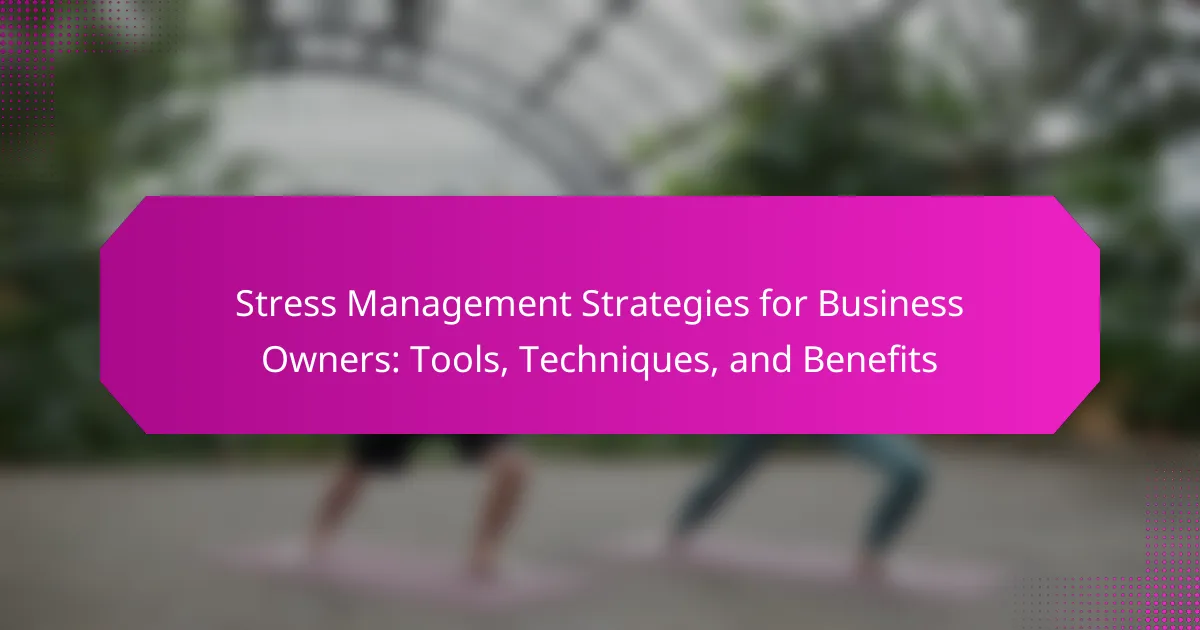Business owners face unique stressors that can hinder productivity and decision-making. Effective strategies include time management, mindfulness practices, delegation, and physical activity. Utilizing tools like mindfulness apps and time management software enhances these techniques. Additionally, rare methods such as forest bathing and sound therapy can significantly improve well-being.
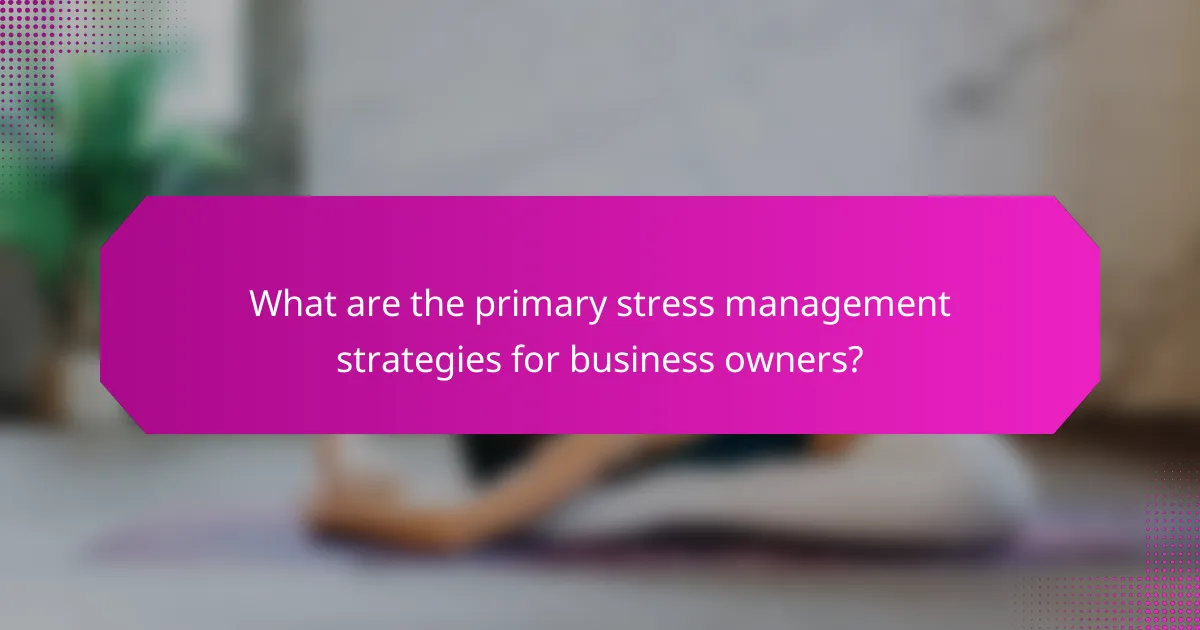
What are the primary stress management strategies for business owners?
Business owners can effectively manage stress through various strategies. Key techniques include time management, mindfulness practices, delegation, physical activity, and seeking support. Each approach offers unique benefits, such as improved focus, reduced anxiety, and enhanced productivity. Time management helps prioritise tasks, while mindfulness fosters emotional resilience. Delegation allows owners to share responsibilities, reducing overwhelm. Regular physical activity boosts mood and energy levels. Lastly, connecting with peers or mentors provides valuable support and perspective.
How can time management techniques reduce stress?
Time management techniques can significantly reduce stress for business owners by enhancing productivity and providing a sense of control. Effective prioritisation, scheduling, and delegation allow for better workload management, minimising overwhelm. Techniques like the Pomodoro Technique or time blocking help maintain focus and reduce distractions, leading to improved efficiency. As a result, business owners can achieve their goals while maintaining a healthier work-life balance.
What are effective prioritisation methods?
Effective prioritisation methods include the Eisenhower Matrix, ABCD prioritisation, and the MoSCoW method. These techniques help business owners manage stress by clarifying tasks based on urgency and importance.
The Eisenhower Matrix categorises tasks into four quadrants: urgent and important, important but not urgent, urgent but not important, and neither. This visual tool aids in decision-making and resource allocation.
ABCD prioritisation assigns letters to tasks based on their importance: A for high priority, B for medium, C for low, and D for tasks to delegate or eliminate. This method streamlines focus on essential activities.
The MoSCoW method categorises tasks into Must have, Should have, Could have, and Won’t have this time. It provides clarity on project requirements and helps manage stakeholder expectations, reducing stress.
How does delegation play a role in stress relief?
Delegation significantly reduces stress for business owners by distributing tasks and responsibilities. This practice allows owners to focus on strategic decisions, enhancing productivity and job satisfaction. By empowering team members, delegation fosters a collaborative environment, which can lead to improved morale and reduced burnout. Effective delegation also enables business owners to manage their time better, leading to a healthier work-life balance.
What role does physical health play in managing stress?
Physical health significantly aids in managing stress by enhancing resilience and coping mechanisms. Regular exercise releases endorphins, which improve mood and reduce anxiety. A balanced diet supports overall well-being, providing necessary nutrients that affect mental health. Sleep quality is crucial; adequate rest helps regulate stress hormones. Additionally, maintaining physical health can foster a sense of control, reducing feelings of overwhelm in business environments. Prioritising physical wellness creates a strong foundation for effective stress management strategies.
How can regular exercise impact stress levels?
Regular exercise significantly reduces stress levels for business owners. Physical activity releases endorphins, which enhance mood and promote relaxation. Additionally, consistent exercise improves sleep quality and boosts self-confidence, both crucial for effective stress management. Studies show that even 30 minutes of moderate exercise can lower stress hormones, contributing to better overall mental health.
What dietary changes can help alleviate stress?
Dietary changes that can help alleviate stress include increasing intake of fruits, vegetables, whole grains, and lean proteins. These foods provide essential nutrients that support brain health and emotional well-being. Omega-3 fatty acids found in fish can reduce anxiety levels. Additionally, magnesium-rich foods like nuts and seeds help regulate cortisol, the stress hormone. Staying hydrated and limiting caffeine and sugar can further enhance mood stability.
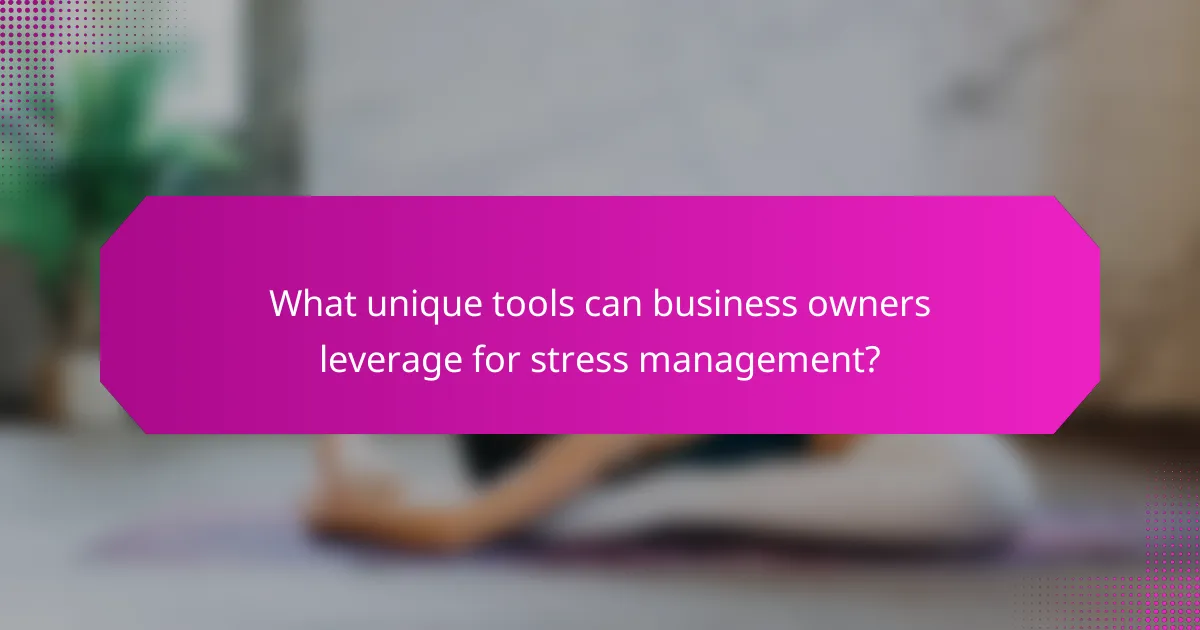
What unique tools can business owners leverage for stress management?
Business owners can leverage unique tools like mindfulness apps, stress management workshops, and time management software for effective stress management. Mindfulness apps, such as Headspace, offer guided meditations to enhance focus. Workshops provide techniques for coping with workplace stress, fostering resilience. Time management software, like Trello, helps prioritise tasks, reducing overwhelm. These tools collectively enhance productivity and well-being, addressing the unique stressors faced by business owners.
How can technology assist in stress management?
Technology can significantly enhance stress management for business owners by providing accessible tools and techniques. Digital platforms offer mindfulness apps, virtual therapy sessions, and stress tracking software that help identify stress triggers. For example, apps like Headspace and Calm provide guided meditations, which can reduce anxiety levels. Additionally, project management tools like Trello or Asana help streamline tasks, minimising overwhelm and improving productivity. As a result, integrating technology into stress management can lead to better work-life balance and increased overall well-being.
What are the best apps for stress tracking?
The best apps for stress tracking include Headspace, Calm, and MyLife. These tools offer unique features like guided meditations, mood tracking, and personalised recommendations to help business owners manage stress effectively.
Headspace provides mindfulness exercises tailored for stress relief. Calm focuses on sleep and relaxation techniques, while MyLife allows users to assess their feelings and suggests activities based on their mood. Each app supports stress management through user-friendly interfaces and diverse techniques.
How can virtual coaching enhance stress management?
Virtual coaching significantly enhances stress management for business owners by providing tailored support and accountability. It offers flexible access to expert guidance, enabling individuals to develop personalised strategies for stress reduction. Additionally, virtual coaching fosters a sense of community, allowing business owners to share experiences and solutions. This collaborative environment can lead to increased motivation and improved resilience against stressors. Engaging with a coach can also help identify unique stress triggers, facilitating proactive management techniques.
What professional resources are available for business owners?
Business owners can access various professional resources for stress management, including coaching, workshops, and online platforms. These resources offer tools and techniques tailored to enhance resilience and productivity.
Coaching programmes provide personalised guidance, while workshops often focus on group dynamics and shared experiences. Online platforms can offer flexible access to stress management techniques, such as mindfulness and time management strategies.
Utilising these resources helps business owners improve mental well-being, leading to better decision-making and enhanced business performance.
How can therapy or counselling support stress management?
Therapy and counselling can significantly enhance stress management for business owners by providing coping strategies and emotional support. These sessions help identify stress triggers and develop personalised techniques for managing them effectively.
Therapists often employ cognitive-behavioural strategies, which can lead to improved decision-making and reduced anxiety. Additionally, regular counselling can foster resilience, enabling business owners to navigate challenges with a clearer mindset.
Research shows that individuals who engage in therapy experience lower stress levels and improved overall well-being. This support system can be a rare but vital resource for entrepreneurs facing the unique pressures of running a business.
What role do business networks play in reducing stress?
Business networks significantly reduce stress for business owners by providing support, resources, and shared experiences. These networks foster connections that enhance problem-solving and emotional resilience. Engaging with peers offers insights that can alleviate feelings of isolation and overwhelm. Furthermore, collaboration within these networks can lead to innovative solutions, ultimately contributing to a healthier work-life balance.

What are the rare but impactful stress management techniques?
Rare but impactful stress management techniques include practices like forest bathing, sound therapy, and biofeedback. These methods offer unique benefits that can enhance well-being.
Forest bathing, or shinrin-yoku, involves immersing oneself in nature, which has been shown to reduce cortisol levels and improve mood. Sound therapy utilises specific frequencies and vibrations to promote relaxation and decrease anxiety. Biofeedback teaches individuals to control physiological functions, helping them manage stress responses effectively.
Incorporating these techniques can lead to significant improvements in stress management for business owners.
How can creative outlets help business owners manage stress?
Creative outlets can significantly help business owners manage stress by providing an effective means of expression and relaxation. Engaging in activities like painting, writing, or music can divert attention from stressors, leading to improved mental clarity and emotional well-being.
Research shows that creative activities stimulate the release of dopamine, a neurotransmitter associated with pleasure and reward, enhancing mood and reducing anxiety. Additionally, these outlets foster problem-solving skills and resilience, equipping business owners to tackle challenges more effectively.
Incorporating creative practices into daily routines can lead to increased productivity and a more balanced work-life dynamic. As a result, business owners can experience greater satisfaction and reduced burnout.
What unconventional methods have been proven effective?
Unconventional methods like mindfulness meditation, nature immersion, and laughter therapy have proven effective for stress management in business owners. Mindfulness meditation enhances focus and reduces anxiety, while nature immersion lowers cortisol levels. Laughter therapy fosters social connections and boosts mood, creating a supportive work environment. These techniques offer unique benefits that traditional stress management strategies may overlook.
How does art therapy contribute to stress relief?
Art therapy effectively contributes to stress relief by promoting emotional expression and self-discovery. This therapeutic approach utilises creative processes to help individuals process their feelings, thereby reducing anxiety and enhancing overall well-being. Studies show that engaging in art activities can lower cortisol levels, a key stress hormone. Furthermore, art therapy provides a unique outlet for communication, allowing business owners to express stressors that may be difficult to verbalise. This can lead to improved mental clarity and decision-making, crucial for effective stress management in a business context.
What is the impact of nature exposure on stress levels?
Nature exposure significantly reduces stress levels for business owners. Studies show that spending time in natural environments can lower cortisol levels, improve mood, and enhance overall well-being. Engaging with nature fosters creativity and boosts productivity, essential for effective stress management. Simple activities like walking in a park or gardening can provide immediate relief and long-term benefits. Incorporating nature breaks into daily routines can be a unique strategy for managing stress effectively.
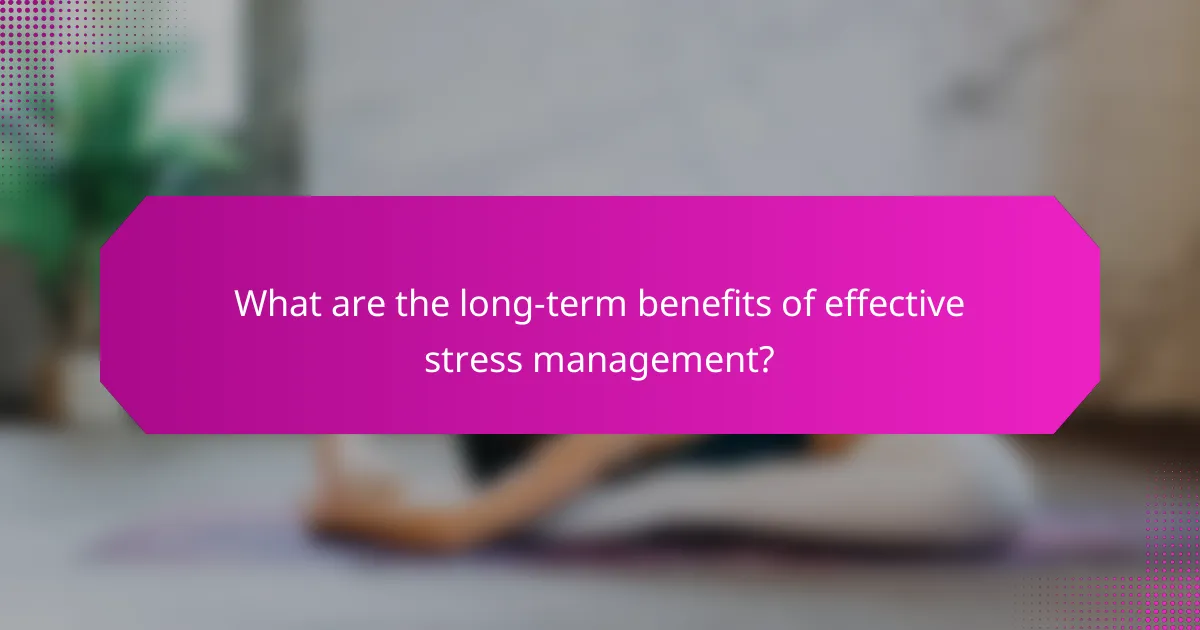
What are the long-term benefits of effective stress management?
Effective stress management leads to improved mental health, increased productivity, and better decision-making for business owners. Long-term benefits include reduced anxiety, enhanced resilience, and stronger relationships with employees and clients. Regularly practising stress management techniques can foster a positive workplace culture, ultimately contributing to sustained business success. Additionally, studies show that businesses prioritising employee well-being experience lower turnover rates and higher engagement levels, reinforcing the value of effective stress management strategies.
How does stress management influence business performance?
Effective stress management enhances business performance by increasing productivity, improving employee morale, and reducing absenteeism. Implementing strategies like mindfulness, time management, and regular breaks can lead to significant benefits. For instance, companies that prioritise mental well-being report higher engagement levels, which directly correlates with improved output and innovation. As a result, fostering a supportive environment becomes essential for sustainable growth.
What are the personal benefits of managing stress effectively?
Effectively managing stress can lead to improved mental clarity, enhanced productivity, and better overall health. Business owners who utilise stress management strategies report increased focus and decision-making abilities. These benefits foster a more positive work environment and can enhance team morale. Additionally, effective stress management can reduce burnout, allowing owners to maintain their passion for their business.
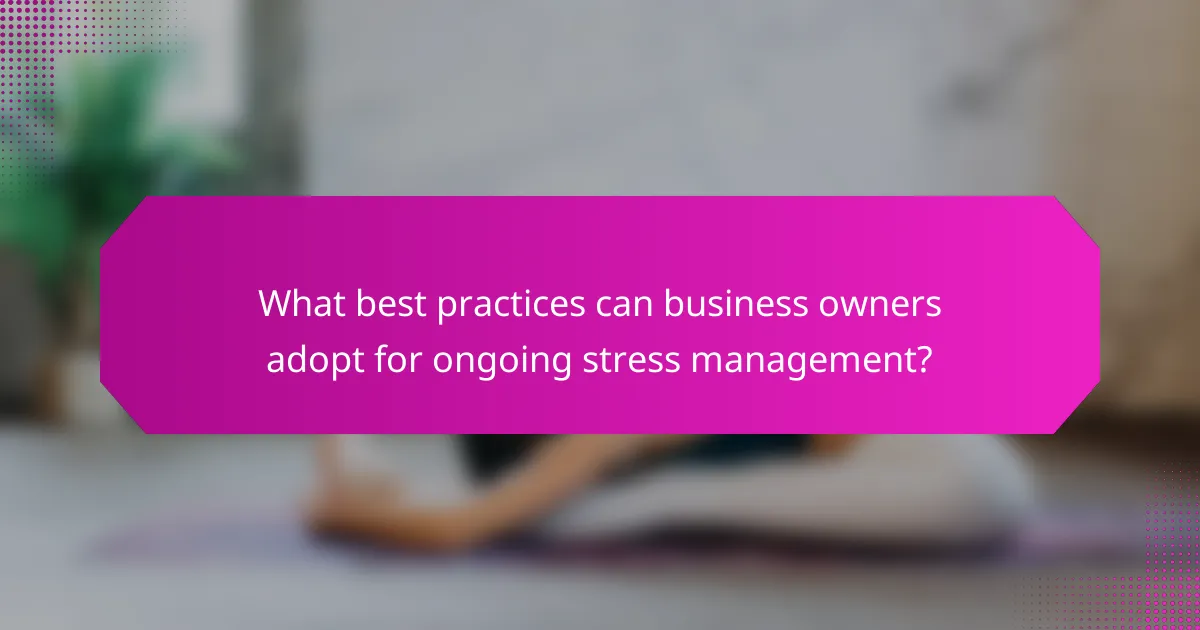
What best practices can business owners adopt for ongoing stress management?
Business owners can adopt various stress management strategies to enhance their well-being and productivity. Prioritising time management helps in balancing responsibilities effectively. Regular physical activity, such as walking or yoga, reduces stress levels significantly. Mindfulness practices, including meditation, can improve focus and emotional resilience. Building a support network fosters collaboration and reduces feelings of isolation. Setting clear boundaries between work and personal life prevents burnout. Finally, seeking professional help when needed ensures ongoing mental health support.
What common mistakes should business owners avoid in stress management?
Business owners should avoid neglecting self-care, failing to delegate tasks, and ignoring signs of burnout. These mistakes can lead to decreased productivity and increased stress. Prioritising personal well-being and effective delegation enhances overall stress management. Additionally, overlooking the importance of a supportive network can hinder resilience. Establishing connections with peers provides valuable support and perspective.
How can regular evaluation of stress management strategies enhance effectiveness?
Regular evaluation of stress management strategies enhances effectiveness by identifying what works best for business owners. This process allows for adjustments based on changing circumstances and individual responses to stress. By consistently assessing strategies like mindfulness practices or time management techniques, owners can optimise their approach, leading to improved mental health and productivity. Data indicates that businesses implementing regular evaluations report a 30% increase in employee satisfaction and a 25% reduction in burnout rates. This proactive stance fosters a resilient work environment, ultimately benefiting overall organisational performance.
What expert insights can guide business owners in stress management?
Business owners can effectively manage stress by implementing structured strategies. Key insights include prioritising time management, incorporating mindfulness practices, and fostering a supportive work environment.
1. Time Management: Utilise tools like calendars and task management apps to organise tasks and set realistic deadlines. This reduces overwhelm and enhances productivity.
2. Mindfulness Practices: Engage in daily mindfulness exercises such as meditation or deep-breathing techniques. Research shows these practices lower stress levels and improve focus.
3. Supportive Work Environment: Encourage open communication and provide resources for mental health support. A positive workplace culture helps alleviate stress and boosts morale.
4. Regular Breaks: Schedule short breaks throughout the day to recharge. Studies indicate that taking breaks enhances overall performance and reduces burnout.
5. Physical Activity: Incorporate regular exercise into your routine. Physical activity is proven to release endorphins, which improve mood and reduce stress.
